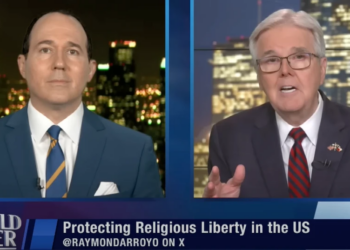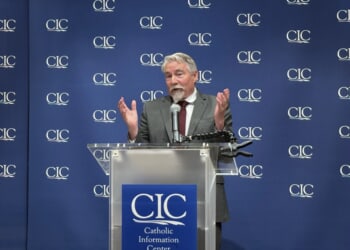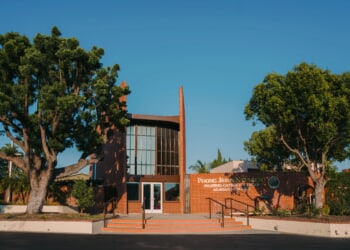ACI Prensa Staff, Aug 28, 2025 /
10:00 am
An HBO series on Marcial Maciel this month has once again placed the spotlight on the founder of the Legionaries of Christ and the complaints of sexual abuse against him.
The congregation in Rome confirmed to ACI Prensa, CNA’s Spanish-language news partner, that it had known about the production for years and agreed to be interviewed to address their past and show the changes the order has undertaken since the scandal.
“Yes, we are aware of the production,” the congregation told ACI Prensa. “At the end of 2022, we received an interview request from the documentary’s producers. The project, according to what they said, would address events that were mostly already publicly known thanks to complaints from victims, former members, and specialists, as well as investigations conducted by the congregation and the Holy See,” the congregation noted.
They specified that Father Andreas Schöggl, LC, former secretary-general and currently archivist of the congregation, was the only one to grant an interview, “due to his thorough knowledge of the history of the Legion and his ability to explain it accurately and transparently.”
The Legionnaires emphasized that “agreeing to the interview did not mean they were collaborating in the production or influencing” the final cut. “We answered every question with complete openness and clarity,” they said.
They noted that their website has a specific section on Marcial Maciel and five annual “Truth, Justice, and Healing” reports. They have also implemented a Safe Environments program and a process of outreach and reparation for victims.
Context of the series
The HBO Max documentary series examines the career of the founder of the Legionaries of Christ.
Maciel was considered a charismatic leader and effective fundraiser for decades, but it was later revealed that he had sexually abused at least 60 minors, battled addiction to a morphine derivative, led a hidden double life, and had at least one daughter.
The first season of the series directed by Matías Gueilburt consists of four episodes. The first, set in the 1940s in Mexico, chronicles the founding of the Legionaries of Christ and the initial warning signs about Maciel, which were ignored.
The second episode, set in the 1950s, describes the Legion’s expansion to Spain and Italy, as well as the start of investigations after the first reports of abuse and his addiction to a morphine derivative became known.
The third, set in the 1990s, depicts his closeness to Pope John Paul II, the launch of Regnum Christi, the revelation of his double life through a 1997 report, and the strategies employed to avoid exposure under growing international scrutiny. The fourth episode is scheduled to air on Thursday, Aug. 28.
The series draws on archives, multiple sources such as journalists and specialists, and testimonies from victims, such as former Legionaries Juan Vaca, Alejandro Espinoza, and José Barba, who recount in detail the abuses perpetrated by Maciel. Throughout the episodes the documentary maintains a respectful tone toward the Church and the victims and uses dramatizations in certain scenes to create a powerful impact.
The congregation explained that, from the beginning, it conditioned its participation on doing so “with openness and humility: facing up to our history, acknowledging the harm caused, and showing the path of renewal we have taken.”
The objective, the congregation stated, was to “contribute to a more complete account of the events” and, at the same time, reaffirm their “commitment to the truth and to the victims, make known the renewal process, to bear witness to the service we provide to the Church today, and to share information about the events verified and compared with multiple sources.”
(Story continues below)
Subscribe to our daily newsletter
Producer Sebastián Gamba’s perspective
Sebastián Gamba, executive producer of Anima Films and the docuseries, explained in an interview with the Spanish-language edition of EWTN News that the Maciel case “really resonates in recent Mexican history” and that the decision to address it was made seven years ago.
Regarding the series’ title, he explained that the reference to Maciel as a “wolf” perfectly represents the person of Maciel, “a sinister character who hides behind religion to commit as much evil as possible.”
Gamba stated that the greatest challenge the production faced was telling a “very painful” story, protecting the victims and showing “the full scope, which is not only the most dramatic and darkest aspect — that of sexual abuse — but many other aspects.”
The producer noted the inclusion of journalists and researchers from various countries, such as Raúl Ormos (author of the Spanish-language investigative book “The Financial Empire of the Legionaries of Christ”), Jason Berry (one of the first to decry abuse in the U.S. in the 1990s), and Idoia Sota (who published a report in 2009 that revealed the existence of Norma Hilda Rivas Baños, a daughter Maciel allegedly conceived with a 17-year-old girl named Norma Baños), among others. “The great challenge was being able to include all these voices and, of course, the voices of the victims,” he said.
The production took almost four years because, according to Gamba, “there’s a whole process of getting to know each other, of understanding from every angle what the project is trying to accomplish, so that the other person really feels like participating or not.”
Regarding the Legionaries of Christ’s participation in the documentary, the producer said that “of course, they condemn Maciel’s entire life” and that “there wasn’t any kind of resistance or obstacles” coming from the congregation or the Vatican.
Regarding how they handled the victims’ testimony, Gamba emphasized that the amount of time allotted was essential to avoid sensationalism.
The subject matter “is treated very carefully. The interesting thing about making a series is that you can give a much more complete overview of these stories.” The person is first presented as a child, “fascinated by the world they found, and then comes the horrific part. This narrative arc avoids sensationalism,” he said.
The producer clarified that the series does not seek to attack faith. “Here, neither religion nor the Catholic Church is called into question. It specifically talks about one person, Marcial Maciel, and his story, which is reprehensible and which absolutely no one defends today, for obvious reasons.”
“I think faith is a wonderful thing; the Catholic religion, for those who live it, is a wonderful thing. And it’s not about that, but rather about showing what human nature can come to, epitomized by a person who committed every evil and abuse within his reach,” he commented.
Background and reports on Maciel and the congregation
Father Marcial Maciel (1920–2008), founder of the Legionaries of Christ in 1941, was investigated by the Vatican in the 1950s for allegations of sexual abuse of minors and misuse of morphine.
He was temporarily removed from office in 1956 and then reinstated two years later. In 2006, 50 years after the Vatican investigation, Pope Benedict XVI removed Maciel from active ministry, based on an investigation the Congregation (now Dicastery) for the Doctrine of the Faith conducted when as Joseph Ratzinger he was at the helm before being elected pope in 2005. The pontiff asked Maciel to lead a life of prayer and penance.
On May 19, 2006, the Holy See issued a statement on the case with the following information: “After having subjected the results of the investigation to careful study, the Congregation for the Doctrine of the Faith, under the guidance of the new prefect, His Eminence Cardinal William Levada, has decided, taking into account both Reverend Maciel’s advanced age and his poor health, to forgo a canonical process and invite the priest to a reserved life of prayer and penance, renouncing all public ministry. The Holy Father has approved these decisions. Regardless of the person of the founder, the worthy apostolate of the Legionaries of Christ and the Regnum Christi association is gratefully acknowledged.”
The progressive discovery of Maciel’s double life provoked a series of crises within both the Legion and Regnum Christi. The Holy See therefore deemed it necessary to conduct an apostolic visitation. The concluding statement of May 1, 2010, reads:
“The apostolic visitation was able to ascertain that the conduct of Father Marcial Maciel Degollado has given rise to serious consequences in the life and structure of the Legion, such as to require a process of profound reevaluation. The very grave and objectively immoral actions of Father Maciel, confirmed by incontrovertible testimonies, in some cases constitute real crimes and manifest a life devoid of scruples and authentic religious meaning. This life was unknown to the great majority of the Legionaries.”
At the same time, the congregation’s superiors launched a process of institutional introspection.
According to the Legionaries of Christ’s 1941–2019 Report, 175 minors were victims of sexual abuse committed by 33 priests of the congregation throughout its history and in different countries. This number includes at least 60 minors abused by Maciel, according to the report. The majority of the victims were adolescents between the ages of 11 and 16.
According to the fifth annual report “Truth, Justice, and Healing,” published in April of this year, since the presentation of the first report in 2019 and through Dec. 31, 2024, the congregation has received 20 additional complaints against Legionary priests not accounted for in the historical report and occurring in different decades.
The latest report also reveals that 61 people who suffered sexual abuse as minors are currently undergoing therapy for healing, 40 of whom are receiving care through the independent organization Eshmá. Since 2022, 21 victims have received financial compensation and comprehensive support.
The document also reports that the reaccreditation of safe environments has begun in various territories, with training programs and follow-up on historical cases. In addition, a study commission on the abuse of authority has been created, the results of which will be presented to the general chapter in January 2026.
A call to discernment
When asked whether Catholics could watch the series confident it accurately portrays the events, the Legionaries in Rome responded that “all information must be approached with discernment” and noted that they make available all the information “on the history of the congregation and aspects of Marcial Maciel’s life” for those who wish to learn more.
Regarding the potential impact of the production, they stated that “to the extent that the damage caused is recognized and the firm commitment to not repeating it, it is useful for the Church, the congregation, and society in general.”
This story was first published by ACI Prensa, CNA’s Spanish-language news partner. It has been translated and adapted by CNA.

















